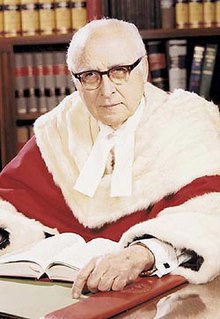Emmett Matthew Hall
|
Emmett Matthew Hall CC QC |
|
|---|---|
 |
|
|
Puisne Justice of the Supreme Court of Canada |
|
|
In office January 10, 1963 – March 1, 1973 |
|
| Nominated by | John Diefenbaker |
| Preceded by | Charles Holland Locke |
| Succeeded by | Brian Dickson |
| Chief Justice of Saskatchewan | |
|
In office 1961–1962 |
|
| Nominated by | John Diefenbaker |
| Preceded by | William Melville Martin |
| Succeeded by | E. M. Culliton |
| Chief Justice of the Court of Queen's Bench for Saskatchewan |
|
|
In office 1957–1961 |
|
| Nominated by | John Diefenbaker |
| Personal details | |
| Born |
November 29, 1898 Saint-Colomban, Quebec, Canada |
| Died | November 12, 1995 (aged 96) Saskatoon, Saskatchewan, Canada |
| Nationality | Canadian |
| Political party | Progressive Conservative |
| Spouse(s) | Isabel Parker (m. 1922) |
| Children | John Hall; Marian Wedge |
| Alma mater | University of Saskatchewan |
| Profession | Lawyer |
| Religion | Roman Catholic |
Emmett Matthew Hall CC QC (November 29, 1898 – November 12, 1995) was a Canadian lawyer, civil liberties advocate, Supreme Court of Canada judge and public policy advocate. He is considered one of the fathers of the Canadian system of Medicare, along with his fellow Saskatchewanian, Tommy Douglas.
Hall was born in Saint-Colomban, Quebec, the fourth of eleven children of James Hall and Alice Shea. His parents were descendants of generations of impoverished farmers of Irish descent in the Saint-Colomban area. Seeking a better life, his family moved to Saskatoon, Saskatchewan in 1910, when Hall was age 12, to take over a dairy farm. The Halls were Roman Catholics, and Emmett served as an altar boy at Saint Paul's Cathedral in Saskatoon.
Hall was in the audience on July 29, 1910, when Prime Minister Wilfrid Laurier laid the cornerstone for the University of Saskatchewan. Hall studied law at the College of Law at the University of Saskatchewan, putting himself through by teaching French in local schools. One of his classmates was John Diefenbaker, future Prime Minister of Canada. He received his law degree from the University of Saskatchewan in 1919.
Hall attempted to enlist in 1917, but was rejected as medically unfit, because he had been born blind in one eye.
In 1922, Hall married Isabel Parker, a legal stenographer from Humboldt, Saskatchewan. They had two children, John Hall, who became a professor of medicine at Harvard Medical School, and Marian Wedge, who like her father, entered the legal profession and was appointed to the Saskatchewan Court of Queen's Bench.
...
Wikipedia
